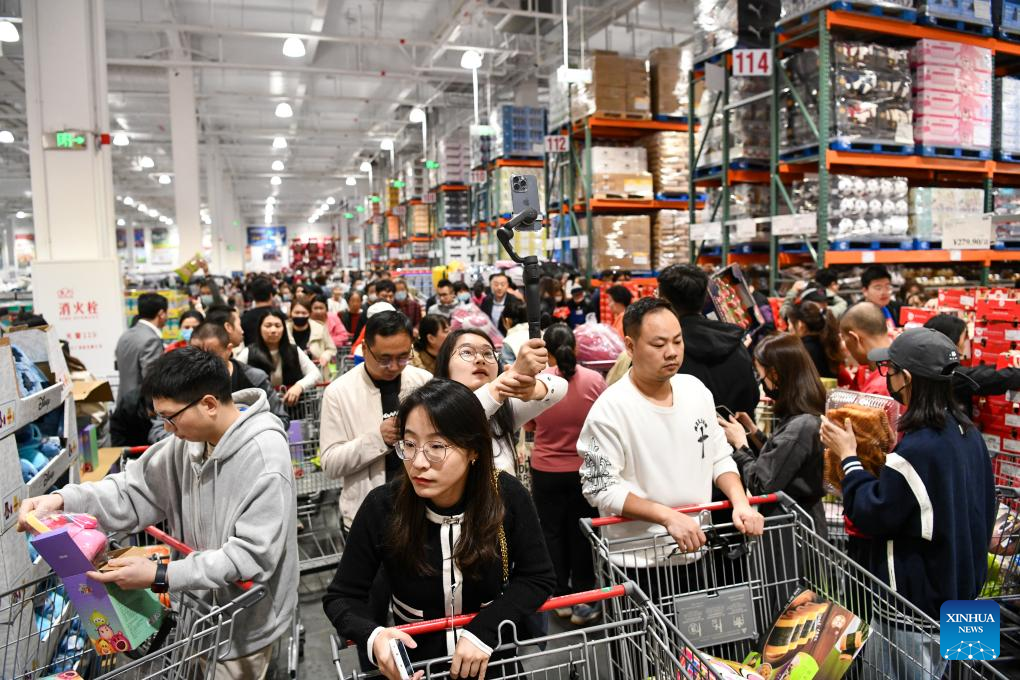
People shop at the new store of Costco in Shenzhen, south China\’s Guangdong Province, Jan. 12, 2024. U.S. retail giant Costco Wholesale on Friday opened a new store in the city of Shenzhen, which is the sixth Costco store on the Chinese mainland. (Xinhua/Liang Xu)
Foreign retailers have recently been expanding their presence in China at an accelerated pace, demonstrating their confidence in the positive trajectory of the Chinese economy.
Having been invested in the Chinese market for over 20 years, French sporting goods retailer Decathlon has increased its investments in China. The company has expanded its product lines to cater to a wide range of customers, from beginners to professional sports enthusiasts.
Additionally, Decathlon has established its own factories, intelligent manufacturing and procurement centers, logistics parks, and brand centers in China. This comprehensive approach enables the company to launch its own branded products, meeting the increasingly diverse needs of Chinese consumers.
\”Chinese consumers are increasingly demanding higher-quality sports products, which drives us to accelerate the pace of introducing new products,\” according to Servando Quevedo, an executive of Decathlon China.
In December 2023, Swedish furniture giant IKEA opened its Beijing-Tianjin customer distribution center in Baodi district, north China\’s Tianjin Municipality. This center, the largest customer distribution facility of the Ingka Group, which owns IKEA Retail, in the Chinese market, represents a total investment of 492 million yuan ($68 million), underscoring IKEA\’s solid confidence in its long-term development in China. The facility stocks over 9,500 IKEA products.
\”As customers\’ purchasing behaviors continue to evolve and their expectations for higher-quality services rise, we are constantly enhancing our capabilities to better meet their demands,\” stated Severine Mathieu, an executive at IKEA China.
She added that the opening of the center presents a significant opportunity for IKEA to better serve the northern Chinese market, particularly in the Beijing-Tianjin area.
In early January 2024, U.S. retail giant Costco Wholesale opened a new store in Longhua district of Shenzhen city, south China\’s Guangdong Province, attracting large crowds of consumers.
According to data from the China Chain Store and Franchise Association, the return on foreign direct investment in China has averaged about 9 percent in recent years, a figure that is relatively high on an international scale.
The remarkable resilience and vitality of the Chinese economy act as a powerful magnet for foreign investors looking to expand their investments in China. In January this year, 4,588 new foreign-invested firms were established across the country, up 74.4 percent year on year.
\”China\’s huge market, which has over 1.4 billion people and a middle-income group of more than 400 million people, combined with the country\’s new journey toward modernization, will create tremendous market opportunities,\” stated Zhu Bing, director of the Department of Foreign Investment Administration at the Ministry of Commerce.
In addition to multinational companies\’ optimism about China\’s potential for economic recovery and development prospects, China\’s continued efforts to broaden its opening-up and promote trade and investment liberalization and facilitation in recent years have greatly improved their enthusiasm to invest in the country.
On Feb. 22, Lawson, the world\’s second-largest convenience store chain, established its Shandong headquarters in Jinan, capital of east China\’s Shandong Province, and announced that its first batch of stores would collaborate with a leading local new retail company.
\”Shandong has committed to maintaining a high level of openness and further attracting foreign investment, which gives us full confidence,\” said Hua Dong, deputy general manager of Lawson (China) Holdings Inc.
\”We chose Jinan for its regional advantages and immense development potential. Over the years, we have been optimistic about the development prospects of the Chinese market. Lawson is striving to achieve the goal of opening 10,000 stores in China by 2025,\” Hua added.
\”China has stepped up reforms of its foreign investment system, intensified efforts to facilitate foreign investment, protected the lawful rights and interests of foreign investors, and improved foreign investment utilization levels,\” said Cui Fan, a professor at the University of International Business and Economics in Beijing.
To foster a new development paradigm and improve foreign investment utilization levels, the key lies in making China\’s huge market more attractive to foreign investment and improving the foreign investment environment, Cui added.
Over the years, China has continuously reduced its negative list for foreign investment. The first negative list, introduced in 2013, contained 190 items, while the current version has been reduced to 31 items, and the version applicable in China\’s free trade zones has been shortened to 27 items.
This year, China will abolish all market access restrictions on foreign investment in manufacturing and reduce market access restrictions in service sectors such as telecommunications and healthcare.
